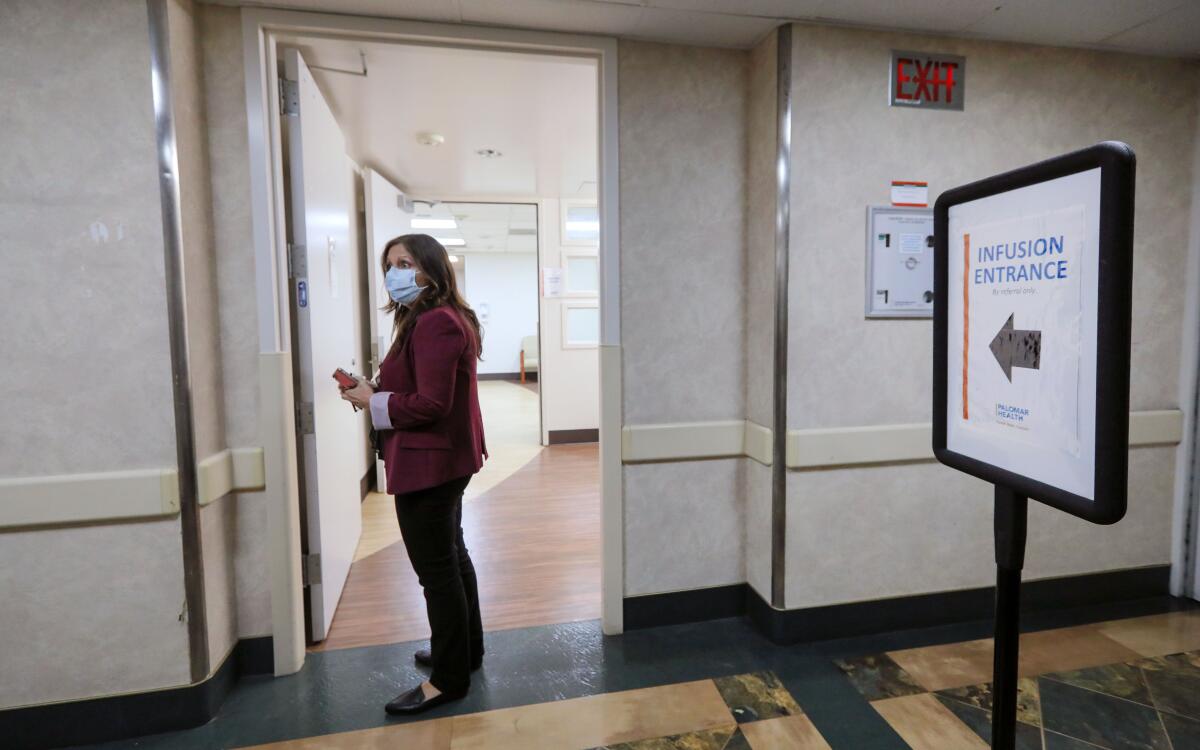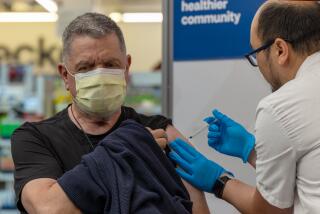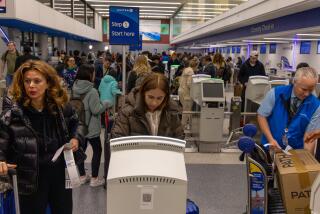There’s a free treatment for COVID-19 in San Diego County. Why aren’t more people using it?

SAN DIEGO — There is a free treatment available in San Diego County that can significantly minimize the severity of COVID-19, and even prevent death, but not enough people are taking advantage of it, officials say.
Drugs containing coronavirus monoclonal antibodies have increasingly shown an ability to pick off the pathogen before it gets the chance to cause critical cases of COVID-19.
The county health department — which in April opened a free monoclonal clinic in Chula Vista, one of California’s hardest-hit cities, in cooperation with the state and San Ysidro Health — has treated only 49 patients in the last 30 days. This is fewer than expected, given that a similar arrangement in Escondido has dosed 247.
The surge in fully vaccinated residents over the past few months has something to do with the overall decrease in the use of monoclonals. Fewer people are getting sick with COVID, and those who do after becoming vaccinated are less likely to be severely affected.
Still, San Diego has averaged 154 new positive coronavirus test results per day over the last two weeks, and hospitals continue to house more than 100 COVID-19 patients daily. The low monoclonal treatment numbers indicate that many are not availing themselves of a treatment that could be a significant benefit, said Dr. Jennifer Tuteur, deputy chief medical officer for San Diego County.
“We’re seeing fewer than we think are eligible to receive the treatment, and we want to make sure we get the word out,” Tuteur said. “We’ve heard from some docs who have said, ‘Oh, well, I don’t think my patient needs to go there; they’re really not sick enough for treatment.’”
That attitude frustrates Dr. Kristi Koenig, medical director of the county’s emergency medical system, because it ignores the point and benefit of monoclonals: Studies show they’re most effective if given shortly after a positive test, while symptoms remain mild — generally headaches, a runny nose, a slight cough or fatigue.
“Those are the ones we want,” Koenig said.
Monoclonals are manufactured copies of protective antibodies found in the blood of patients who successfully fought off coronavirus infections. These microscopic proteins are just the right shape to quickly attach to the virus when it enters the body and trigger a quick response from the immune system.
“You want to get those antibodies to glom onto the virus as much as possible before it can start getting into the cells,” Koenig said. “You really want to get to them as early as possible.”
Family Health Centers of San Diego, the region’s largest federally qualified community clinic network, has treated about 300 patients at its monoclonal infusion centers in Hillcrest and Chula Vista since late December, Dr. Christian Ramers, chief of population health, said.
“Certainly, the numbers are dwindling as case rates fall in the county, but there has been a recent expansion of eligibility criteria, and we still feel that we’re missing a large swath of eligible people due to low awareness,” Ramers said.
The medical community was initially cautious about using CoV-2 monoclonals. The National Institutes of Health and the Infectious Disease Society of America held back full endorsements due to what they said was a lack of deep evidence of efficacy. But both organizations have since modified their takes, endorsing these drugs in patients with mild to moderate COVID-19 symptoms who have risk factors that make them more likely to develop severe disease.
Updated research shows that in 518 patients who received a cocktail of two monoclonals, Bamlanivimab and Etesevimab, only 11 were hospitalized, compared with 36 out of 517 who received a placebo. Twenty-nine days after infusion, none of those who received monoclonals had died, while 10 in the placebo group had died.
Results have been similar for Casirivimab and Imdevimab, the other two-drug cocktail in use.
While this silver bullet does not hit the mark every time, it does connect more often than not, resulting in a 70% reduction in a patient’s chances of seeing a minor infection become full-blown COVID-19, studies have found.
And this ammunition recently became more widely available than ever before.
On May 14, the FDA expanded its treatment guidelines for monoclonals, adding to the list of potential patients those who are overweight; pregnant; have cardiovascular disease, including high blood pressure; and have chronic lung disease, including asthma. The list already included those with obesity, chronic kidney disease, diabetes and neurodevelopmental disorders. Additionally, anyone 65 and older qualifies, as do those 12 and older of a race or ethnicity that is disproportionately affected by COVID, regardless of underlying health conditions.
Some may feel they do not need to bother with such drugs if they have been partially or fully vaccinated before testing positive. But monoclonals can be useful even for those who have had a shot.
“If they test positive and they have symptoms, then the monoclonal antibodies do assist,” Tuteur said. “We know that while the vaccines are very good, they are not 100% effective.”
Sisson writes for the San Diego Union-Tribune.
More to Read
Sign up for Essential California
The most important California stories and recommendations in your inbox every morning.
You may occasionally receive promotional content from the Los Angeles Times.











